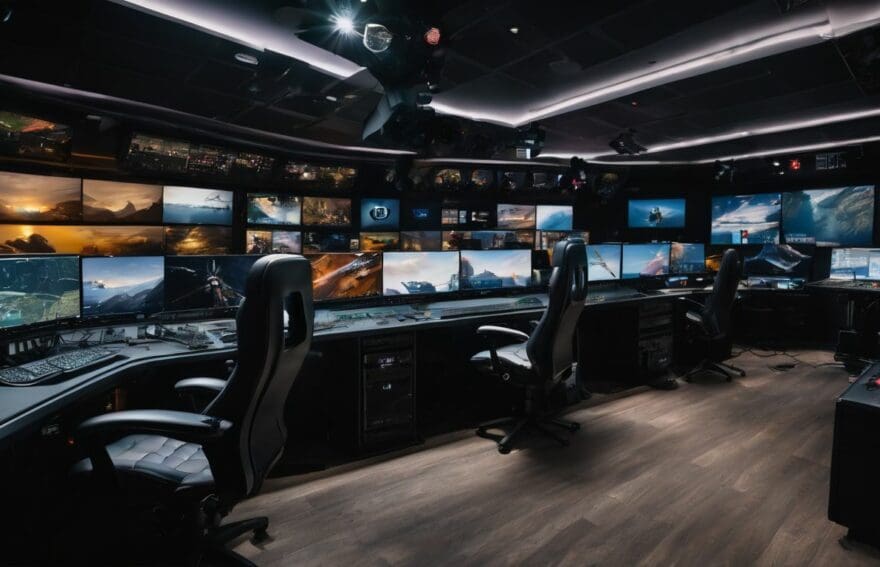The Esports Team Behind the Scenes: Careers in Support Roles

Updated On: October 24, 2025 by James Connolly
Have you ever found yourself marvelling at the intricate dance of an esports competition, pondering over who pulls the strings from behind the curtain? It’s a question that tickles the curiosity of many, and we’ve taken it upon ourselves to pull back that curtain and introduce you to these unsung backstage heroes.
In this post, we’re turning the spotlight on those essential support careers that keep the electric world of professional gaming buzzing – from eagle-eyed strategy analysts to the event wizards orchestrating every detail.
Dip your toes into this exciting realm and explore where your fervour for gaming could very well take you!
The Growing Esports Ecosystem
Shifting our focus from the introduction, let’s delve into the expanding universe of competitive gaming. The esports ecosystem is flourishing and branching out in numerous directions; it’s not just about the players who expertly navigate virtual worlds anymore.
This dynamic industry now supports an array of careers that cater to every aspect of the gaming experience, epitomising a true fusion of passion and profession.
We see this growth reflected in the surge of roles ranging from team management to event organising, and content creation to technical support. Within this vibrant framework live many passionate individuals—team managers aligning strategies, shoutcasters electrifying audiences with their commentary, analysts dissecting gameplay for competitive edges and social media gurus connecting fans across platforms.
These professionals form the backbone that upholds professional gaming teams and brings large-scale esports events to life, proving that a career in esports can be as enthralling behind-the-scenes as it is on-screen.
Key Support Roles in Esports Careers
In the world of esports, there are many important support roles that contribute to the success of a team or event. These roles include team managers, analysts, content creators, event organisers, shoutcasters (casters)/hosts, and social media/community managers.
Each role is crucial in its own way and offers opportunities for those looking to break into the industry.
Team Manager
Team managers play a vital role in the success of an esports team, handling various responsibilities to ensure smooth operations. Their duties include organising team schedules, managing player contracts and salaries, coordinating travel arrangements for tournaments, and serving as the primary point of contact between players and upper management.
Team managers also handle logistics during events, ensuring that players have everything they need to perform at their best. Moreover, they are responsible for fostering a positive team environment by addressing any conflicts or issues that may arise amongst team members.
In addition to administrative tasks, team managers often take on a mentoring role, providing emotional support and guidance to players when needed. They act as a liaison between the coaching staff and players, facilitating communication and helping implement strategies effectively.
Analyst
As analysts, we play a crucial role in the success of an esports team. We use data and performance metrics to provide valuable insights that help teams make strategic decisions during gameplay.
Our expertise enables us to identify areas for improvement and devise effective strategies to outperform opponents, contributing significantly to the team’s overall success. By analysing gameplay trends and statistics, we offer valuable guidance on tactics, player positioning, and game strategies.
Our role as analysts involves working closely with coaches and players to develop tailored training programs based on our findings. This collaborative approach ensures that our insights directly contribute to enhancing the team’s performance, ultimately leading them towards victory in high-stakes tournaments.
Content Creator
As content creators in the esports industry, we craft engaging and informative digital content, including videos, live streams, articles, and social media posts to entertain and educate gaming enthusiasts.
Our role is crucial in promoting teams, players, tournaments, and brands across various platforms. With a deep understanding of gaming culture and trends, we produce captivating content that resonates with our audience while staying relevant in the constantly evolving esports landscape.
Leveraging creativity and technical skills allows us to showcase the excitement of competitive gaming and contribute to building strong communities around our favourite titles.
Event Organiser
Esports event organisers play a crucial role in planning and executing successful gaming tournaments. They oversee all aspects of the event, from venue selection and logistics to coordinating with sponsors and managing the competition schedule.
This role requires strong organisational skills, attention to detail, and the ability to handle high-pressure situations. Event organisers must also stay updated on industry trends to deliver engaging experiences for both players and spectators.
The responsibilities of an esports event organiser include creating a seamless experience for participants, ensuring fair play, adhering to regulations set by governing bodies such as national esports federations, and providing a platform for gaming enthusiasts to showcase their skills.
Shoutcaster (Caster)/Host
Shoutcasters and hosts are vital in creating an engaging atmosphere during esports events. They provide live commentary, analyse gameplay, and entertain the audience with their energetic delivery.
With a deep understanding of the game, shoutcasters bring expertise to the broadcast by providing insight into player strategies and exciting moments of action. Meanwhile, hosts ensure smooth transitions between segments, engage with viewers, and conduct interviews with players or special guests.
Their ability to captivate audiences adds excitement to tournaments while also helping to build connections within the gaming community.
In addition to delivering play-by-play analyses, shoutcasters offer valuable insights that enhance viewers’ understanding of gameplay tactics. Hosts serve as ambassadors for the event, using their interpersonal skills to connect with fans and keep them informed about all aspects of the competition—from team rosters to match schedules—creating an inclusive environment for both experienced gamers and newcomers alike.
Social Media/Community Manager
Transitioning from the dynamic role of a shoutcaster or host, the social media/community manager is an integral part of an esports team’s behind-the-scenes operations. These professionals are responsible for engaging with fans and followers across various social media platforms.
They create compelling content, manage online communities, and drive brand awareness for the esports team or organisation.
Social media/community managers use their creativity to develop engaging posts, interact with the audience in real-time during events, and effectively represent the team’s voice online.
How to Get Started in an Esports Support Role Career
To get started in an esports support role career, individuals can pursue education and training options, network and build a portfolio, seek internships and volunteer opportunities, as well as continually learn and adapt to the ever-changing industry.
Interested in learning more about these exciting career pathways? Keep reading to discover the demands and challenges of support roles in esports!
Education and Training Options
When pursuing a career in esports support roles, there are various education and training options available. Relevant degrees in fields such as business management, marketing, communications, or sports management can provide a solid foundation.
Additionally, specialised courses or certifications in event planning, social media management, video production, and data analysis can equip individuals with the necessary skills for specific support roles within the esports industry.
Furthermore, internships at gaming companies or volunteer opportunities at esports events can offer practical experience and valuable networking opportunities.
For those interested in content creation or shoutcasting/hosting positions within the esports industry, honing skills through online tutorials and practice sessions can be beneficial.
Networking and Building a Portfolio
To kickstart a career in an esports support role, networking and building a solid portfolio are crucial steps. Engage with like-minded individuals at industry events, join relevant online communities, and connect with professionals on platforms such as LinkedIn to expand your professional network.
Be proactive in seeking opportunities for internships or volunteer positions within esports organisations; practical experience is invaluable for building a comprehensive portfolio.
Showcase your skills by creating content or contributing to projects related to the specific support role you aspire to pursue. Building a diverse body of work will demonstrate your capabilities and dedication within the competitive realm of esports support roles.
Understanding the demands of this fast-paced industry is key — there’s no room for complacency as it continues its rapid expansion. As aspiring individuals navigate their way through this vibrant sector, continuing self-improvement should be constant and adaptability second nature.
Internships and Volunteer Opportunities
Internships and volunteer opportunities are invaluable for gaining practical experience and making industry connections in the esports field. These roles offer hands-on involvement in event planning, content creation, social media management, or team support.
As an intern or volunteer, one can learn about the demands of the industry while building their skills and portfolio to kickstart their career. It’s also a chance to demonstrate enthusiasm, dedication, and teamwork – qualities highly valued by potential employers.
By actively participating in events or projects, individuals can gain insight into various support roles while contributing to the success of esports teams and organisations.
As an intern or volunteer within the esports industry, individuals have the opportunity to work directly with professionals who carry out vital roles such as managing players, organising events, creating captivating content, or engaging with communities.
Continual Learning and Adaptability
Continual learning and adaptability are essential in the fast-paced world of esports careers. Staying updated with the latest gaming trends, industry developments, and technological advancements is crucial for excelling in support roles.
As the esports landscape evolves, professionals must remain flexible to embrace new strategies, tools, and best practices. Whether it’s mastering a new game analysis software or understanding the dynamics of emerging social media platforms, ongoing learning ensures relevance and competence.
In addition to specific technical skills, adaptability plays a pivotal role in effectively navigating the dynamic nature of esports careers. From adjusting team management approaches based on player preferences to innovating content creation techniques that resonate with changing audience interests, being adaptable enables professionals to thrive amidst industry transformations.
The Demands and Challenges of Support Roles in Esports
Support roles in esports come with long hours, high stress levels, and the constant need to adapt to an ever-evolving industry. Balancing multiple responsibilities can also be challenging for those working behind the scenes in esports.
Long Hours and High Stress Levels
Support roles in esports come with demanding schedules and high-pressure situations. Team managers, event organisers, content creators, and analysts often work long hours to ensure everything runs smoothly behind the scenes.
The fast-paced nature of the industry requires support staff to adapt quickly to changes and manage multiple responsibilities simultaneously. It’s not uncommon for these professionals to experience high stress levels due to the ever-evolving demands of their roles.
Esports careers involving support roles demand individuals who can thrive under pressure while maintaining a keen eye for detail. Long hours are a common occurrence as events may span several days or involve international travel, leading to rigorous work schedules.
Constantly Evolving Industry
Adapting to the constantly evolving industry is essential for success in esports support roles. With new games, technologies, and strategies emerging regularly, staying up-to-date with industry trends is crucial.
Understanding the latest developments and being able to integrate them into team management, event organisation, content creation, and other support roles can give professionals a competitive edge.
As the esports landscape continues to change rapidly, professionals must be ready to evolve their skills and knowledge to meet the demands of this dynamic industry.
The demand for adaptability in the constantly evolving world of esports means that those in support roles need to embrace continual learning. Whether it’s mastering new game mechanics or leveraging innovative marketing techniques, staying abreast of changes keeps individuals relevant and valuable within the industry.
Balancing Multiple Responsibilities
Balancing multiple responsibilities in esports support roles demands effective time management and multitasking skills. Whether overseeing team logistics or managing social media campaigns, juggling diverse tasks is essential for success.
From coordinating travel arrangements to liaising with sponsors and handling event logistics, the role of a team manager involves substantial multitasking. Similarly, being an event organiser requires balancing various elements such as venue coordination, broadcast production, and player hospitality.
As a content creator or analyst within the industry, maintaining a balance between research, content creation, and audience engagement is crucial.
The demands of these support roles often involve adapting to rapidly changing schedules and priorities while ensuring seamless teamwork across different projects and assignments. Balancing these numerous responsibilities necessitates exceptional organisational skills alongside effective communication with team members and external partners.
Conclusion: The Future of Esports Support Roles and Career Growth Opportunities
In conclusion, the future of esports support roles offers exciting career growth opportunities. As the industry continues to expand, there is a growing demand for skilled individuals in various support positions.
With dedication and ongoing learning, aspiring professionals can carve out fulfilling careers behind the scenes in the dynamic world of esports. The evolving nature of the industry presents numerous pathways for those passionate about gaming and event production to make their mark in pivotal support roles.
FAQs
1. What kinds of careers can you find supporting an Esports team?
Answer: You can build a career in esports team management, become a shoutcaster or host for events, create content focused on gaming, coach players, analyse game data, and organise tournaments.
2. Are there different roles in an esports team besides the players?
Answer: Absolutely! Behind the scenes of an esports team are key positions like team managers or owners, event organisers, coaches and support staff working in administration and operations.
3. Can I work in the esports industry if I’m not good at playing games?
Answer: Certainly! The esports industry offers plenty of career opportunities that don’t require gaming skills such as managing teams, organising events and creating engaging content.
4. Is it possible to study for a career in the Esports industry?
Yes indeed; some universities now offer courses as part of an esports curriculum covering subjects like esports management and event organising to prepare students for various roles within this thriving sector.
5. How important is coaching within Esports teams?
Coaching is critical as it helps improve player performance through strategy development and personal guidance which enhances overall success rates during competitions.








